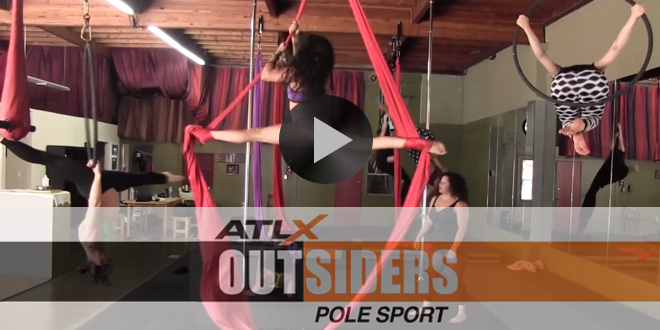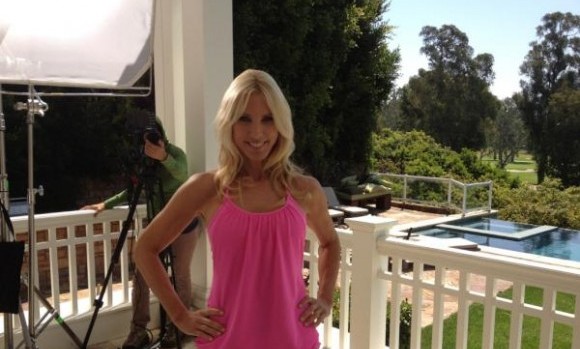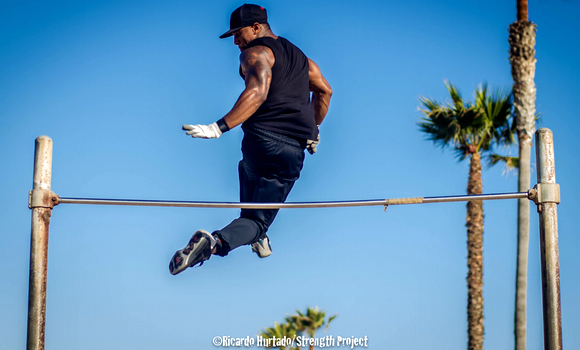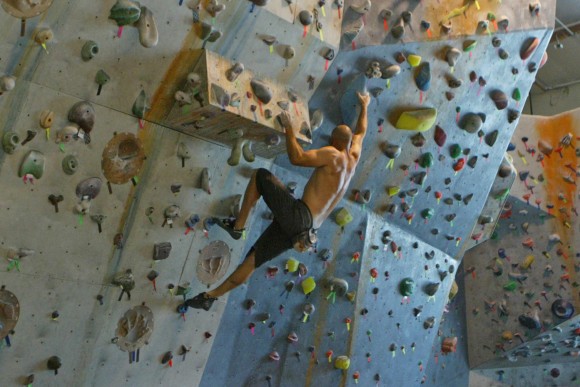By: Morgan Urtso
With a movie in the making and Unstoppable about to hit the Bestsellers list, 2011 NCAA National Wrestling Champion Anthony Robles took the time to sit down with ATLX to talk inspiration, memories and the Olympic wrestling controversy. Between wrapping up a six-and-a-half-week book tour spanning across 28 states, clocking appearances on Jay Leno, Ellen, Steve Harvey, the 700 Club and ESPN, and hopping on a plane to Cabo for a speaking event, the incredible athlete and 2012 Inductee to the National Wrestling Hall of Fame caught up with us for a quick ATLX exclusive.
Ok Anthony, let’s start at the beginning. You were born without your right leg. The doctors couldn’t explain why? They didn’t have a reason for it?
Anthony: No, they didn’t expect me to be born without it. Back then, technology obviously isn’t what it is now. So as far as my mom knew, I was perfectly healthy and I was going to come out normal. And yeah, they couldn’t explain it. They just said it was a very rare thing that just happens. Other than a missing limb, I was perfectly healthy.
Growing up, they told my mom that more than likely she would have to take care of me the rest of my life. At the time she was 16, and they weren’t telling her to give me up for adoption, but they were kind of suggesting that she might be over her head with me because she was a single parent for a while.
But I have a great mom. She never accepted the thought that I couldn’t be normal. She never accepted that just because I was missing a leg I couldn’t be self-sufficient and do whatever I wanted to. So growing up, my mom always pushed me and encouraged me to try challenging things, whether it was sports or something else. She was always trying to encourage me, really trying to help me to learn to believe in myself and believe in those abilities that I had.
I’ve heard you credit your mother countless times as a huge factor in your success, and she has had such a huge influence on your life, believing in you and helping you believe in yourself. What role did she play when you got involved in wrestling? And what interested you about it in the first place?
AR: Actually, initially I wasn’t interested in wrestling at all. I lived in California until I was 14, and I was big into football. I played tackle football from sixth grade all the way up to ninth grade. We moved to Arizona when I was 14, to Mesa. And it was actually an older cousin of mine who suggested wrestling, because as a 14-year-old kid I was really undersized. I was only like 90 pounds at the time. All the other kids on the football team were huge and gaining size while I was still a shrimp. So my cousin was telling me, “hey you’re too small for football; let’s check out wrestling.” They have weight classes and all that.
I didn’t even want to try it. I went to practices and watched it, and I wasn’t interested. But one of the guys just forced me to try it , so I went out there on the mat and wrestled one of his teammates. And I got my butt kicked, haha, but I just fell in love with the sport. The passion just grew in me overnight.
My mom was very supportive with it. Football is tough, but wrestling is real physical. She was a little bit nervous about that, because she knew I’d be wrestling one-on-one with someone else, but she was very supportive. The day I told her, she said, “Ok, well what do you need to compete? What gear do we need to get you so you can get into it?” And she was there for every single match that I wrestled at in Arizona.
So you wrestled throughout high school in Mesa and then you decided to go to Arizona State. Why’d you choose ASU?
AR: I wasn’t highly recruited out of high school. I was a two-time state champion, a high school national champion, sitting there with a pretty good high school record, but Division-I schools were very cautious with me. They didn’t know if I would be able to excel and compete at that level, because I was at a disadvantage. So I only got two Division-I phone calls from schools. One was in Pennsylvania, and the other was Arizona State.
I liked ASU because it was my hometown, I was the local boy, and as I started getting into my wrestling career in high school, I would watch ASU compete. I remember seeing Ryan Bader, CB Dollaway, Cain Velasquez… I remember watching those guys compete and wanting to be on the team with them – wanting to wrestle with those guys. So ASU, not only was it one of the few schools interested in me, but it was one of those schools I was most interested in going to. So it sucked that I didn’t get many offers, but it played out that they wanted me.
Awesome. It definitely worked out well. At any point while you were at ASU or in high school, or at any point in your life, did you ever feel defeated or feel like giving up?
AR: Yeah, there was a time I felt defeated. It was my junior year at ASU. That Nationals, I lost in the quarterfinals. At the time I was ranked third or fourth in the country, and they were projecting me to be a possible champion that year. There was a lot of stuff going on outside of the sport, with my family. My stepdad had walked out on us, left my mom with my younger siblings, and I was working a night job to help out. So really, mentally I was exhausted. That was just a lot of stress on me.
I remember I lost in the quarterfinals against a guy I had beat earlier in the season, and I finished seventh in that tournament. I was planning on quitting and not coming back my senior year. I didn’t want to do it anymore, and I went through kind of a depression phase through that summer. I didn’t train, didn’t go visit ASU or the team, pretty much stayed away.
But one of the things that happened, which was pretty amazing, was I got a stack of letters over the summertime. It was from an elementary school. Third graders. They all wrote me, saying they saw my tournament and saw that match… they wanted to write me to encourage me after that loss. I remember reading 30 or so letters from these kids, in their own handwriting, saying I was their hero and stuff like that. It really put a bigger picture in my mind: What am I competing for?
From that moment on, it became more than just about myself and winning the national title. It was for those kids who were looking at me as a role model. I didn’t want to let them down.
Speaking of being a role model and seeing that as something you needed to follow through with, you’re a motivational speaker. What points are you always sure to make to the people you speak to?
AR: One of the biggest points that I like to make is that we all wrestle with challenges. There’s always going to be a point in time where it’s not going to be easy, when you feel like you just got knocked down on your face. But I tell them you can’t let the challenges become an excuse. You can’t let them become something that makes you say, “I can’t move forward, it’s too hard now, might as well turn back.” I think my junior season is the perfect example of that. I wanted to quit. I wanted to walk away. But you can’t do that, you have to fight through it.
And it was your senior year that you were a National Champion.
AR: Yes, 2011.
The year after you almost quit altogether, you came back and took it further than you did the year before. To the top. Was that the ultimate moment for you?
AR: Oh yeah, absolutely. Coming back the last season, that final season was kind of my goodbye run. Really, I felt like I was having the most fun I’d ever had. Competing, going in every night fired up. I kept receiving constant letters that season, fanmail from people, and I didn’t view it as pressure. I viewed it as a support system. It made me that much more fired up to go out there and it helped me through.
Any other milestones? Obviously, the national championship, but anything else?
AR: One of the huge honors for me was getting the Jimmy V award for perseverance at the ESPYs. That was a huge milestone for me. A huge honor. Because as I started getting more and more into motivational speaking, I was learning and watching some of the great speeches from the past. Jimmy Valvano, right before he died, gave one of the most inspiring speeches ever. So just to receive that award was a huge honor for me.
On top of motivational speaking, you’re also an author. You just finished a huge book tour. What can readers find in your book, Unstoppable? What do you hope they’ll take away from it?
AR: When I was writing the book, one of my big things was that I didn’t want it just to be about wrestling. I wanted the book and my story to come out in a way that not just athletes, but non-athletes could relate to. Those life challenges. The whole purpose behind it was because I wanted them to get a sense of hope. No matter what they’re up against, no matter what the challenges, and no matter what’s dragging them down in their life, I just wanted them to know that it doesn’t have to stop them. It doesn’t have to decide their fate in the end. If you’re not from the perfect family, the perfect upbringing, it doesn’t have to affect who you become. It doesn’t have to bring you down and keep you from achieving your dreams.
So I’m just hoping that if even one person reads it and he can relate in some way and it inspires him to get through something, that’s what makes it all worth it. We’ve all got those people in our lives. Maybe it was just some small thing they said or some small act that they did for us, but they changed our lives. We can all say that. One of the biggest things that I can’t stand today is those athletes today who say they did it all on their own. It’s never true. Someone along the way either opened a door for you or helped you get up one step to that next level, and that’s why you’re there.
I’ve just been blessed to have those people in my life and I want to turn around there and, through my book or just speaking, I want to be that next stepping stone for the next Anthony Robles or the next inspirational story or the next underdog.
So what’s your favorite wrestling memory?
AR: Favorite wrestling memory? Definitely winning the nationals. Just hearing 20 thousand fans roaring and seeing your name as a national champ, there’s nothing like that. Standing in that full arena, I wish I could relive that moment every single day. There’s not a day that goes by now that I don’t think about that one experience. That feeling, hearing the crowd going nuts like that.
Of course. And lastly, what do you think about the Olympics potentially taking wrestling out of the Games? What is that about?
AR: I think it’s crazy! It’s absolutely ridiculous because the Olympics were founded on wrestling. Wrestling is the oldest sport. 71 countries participated in wrestling in the Olympics this past year in London and that’s a record for participation in an event.
For them to want to take it out? It’s nuts. I know it’s not official just yet. From what I’m understanding right now, they’re supposed to be meeting in two months in St. Petersburg to discuss it. So I don’t think it’s going to go through after the huge support wrestling has gotten because of this news. I just think the wrestling community, even MMA, because wrestling is such a huge feeder into that, needs that support. We need people to continue to write the letters to the IOC and voice their opinion and show how much they care about it so we can keep it around. We need to keep fighting the battle to move forward and not forget what’s going on right now.
Ryan Bader on Anthony Robles:
audio and photo in above media courtesy of The Power MMA Show
 ATLX The only sports entertainment television and digital media network fully devoted to everyday athletes, athletic lifestyle and athletic culture.
ATLX The only sports entertainment television and digital media network fully devoted to everyday athletes, athletic lifestyle and athletic culture.




